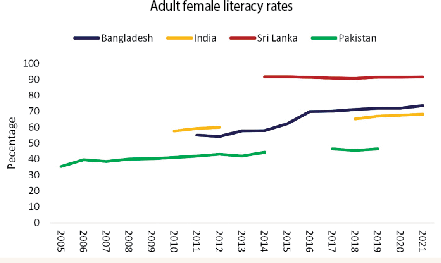
Increasing tax collection to reduce the fiscal gap and expand investment on the socio-economic development has been a priority for successive governments. Therefore, the Federal Board of Revenue (FBR) has undergone a series of policy and administrative reforms over the years.
As a result, revenue collection increased in absolute terms from Rs200 billion in 1994-95 to around Rs4 trillion in 2017-18. Despite the substantial increase, the low tax-to-GDP ratio (13 per cent), narrow tax base (1.4 million taxpayers in a population of 208m) and high reliance on border taxes (around 50pc of tax revenue) suggest large untapped potential for domestic revenue mobilisation.
This year, Pakistan is witnessing a historical tax collection shortfall. This can partially be attributed to a slowdown in economic activity as well as strategic and managerial issues. To address these constraints, the government has embarked upon an ambitious tax reform agenda. It has bifurcated the operational and policy functions of the FBR and is negotiating another tax administration reform project with development partners.
The government should create a separate entity within the FBR to administer VAT
The earlier set of reforms, implemented from 2005 to 2011 under the umbrella of the Tax Administration Reform Project (Tarp) of the World Bank, met with partial success. It is time we critically analysed its impact and incorporated insights in the new programme.
Besides other elements, Tarp rightly focused on expanding the coverage of the Value Added Tax (VAT), commonly called sales tax in Pakistan. VAT is a major source of revenue in around 120 countries. It raises about $18tr in taxes — roughly one-quarter of all government revenue, according to the World Bank. Being a general tax imposed on both imports and domestically produced goods, VAT possesses two advantages: first, it is less distortionary — it generates distortions only on the consumption side whereas a tariff induces distortions on both production and consumption sides — and second, it has more revenue potential than import tariffs.
Before the reforms under Tarp, the Customs was administering VAT at both domestic and import stages. Later, the country shifted the collection of VAT at the domestic level to the Inland Revenue Services (IRS) while the collection at the import stage remained with the Customs. This policy shift aimed at the functional integration of income tax, sales tax and federal excise duty at the domestic level, leading to increased revenues by broadening the base of sales tax.
This institutional arrangement has been in place for the last eight years. A simple analysis of tax collection data for the last eight years (2010-18) under the IRS administration along with statistics from a comparable period under the Customs administration (2002-09) indicates that the average sales tax growth rate under the latter was 18.37pc. But it dropped to 12.44pc under the IRS administration.
The shift in the administration is associated with a drop in revenue collection by 5.93pc on average. It amounts to a cumulative loss of about Rs590bn, which is in addition to a large cost incurred in the expansion of the tax bureaucracy. The increased tax rate from 13pc to around 17pc in this period has also hurt the earlier pace of growth.
In terms of the broadening of the tax base, the year-on-year growth rate of returns declined from 8.95pc in 2009-10 to 5.45pc in 2017-18. The growth rate was highest in 2009-10, the year of the administrative switch. Sales tax collection edged upwards in 2002-10, but it has been declining since then. In the earlier period, sales tax collection at the domestic stage was higher than the same at the import stage. However, this trend reversed, thus widening the gap between sales tax revenues at domestic and import stages.
There could be many reasons for this decline, but the following structural issues are hard to ignore. First, these changes in management led to the weakness in enforcement operations and a loss of institutional knowledge. A majority of Customs officers decided to stay in their own service group instead of joining the IRS. The IRS was struggling to widen income tax and corporate tax nets and, therefore, could not give full attention to its new responsibility.
Second, around 700 auditors, who are the backbone of the enforcement machinery, felt discontented because of a lack of proper career path in the new organisational setup.
Third, conceptual differences in sales tax and income tax also played their role. Sales tax is theoretically closer to customs duty because both are computed as a fraction of the value of goods. Income tax, however, is based on the intricate principles of public finance to arrive at the net taxable income.
These statistics indicate that the government needs to revisit its earlier decision and reassign tax collection functions not only within the FBR, but also between the federation and provinces. Since sales tax has big potential as the vast retail sector remains out of the tax net, a proper design of the tax machinery can quickly boost much-needed revenues. Instead of blaming the donors for the reforms that led to the drop in tax revenue, it is important to seek a way forward. Returning the administration of VAT to the Customs is not an option as they need to focus on their core functions: regulation of trade, facilitation of international business, border management and anti-smuggling.
The ideal solution is to transfer the VAT administration to the provinces as the ongoing structural transformation of the economy has increased the share of services in GDP (58pc), which is a provincial subject. The Sind Revenue Board (SRB) is depicting a stellar growth rate in sales tax collection on services, but other provinces still need to beef up their tax machinery.
Therefore, the most practical option is to create a separate entity within the FBR to administer VAT. This new entity can draw expertise from the Customs, IRS and the private sector and operate along the lines of the SRB.
The writer is an economist
salamat.ali@alumni.lse.ac.uk
Published in Dawn, The Business and Finance Weekly, May 27th, 2019

































